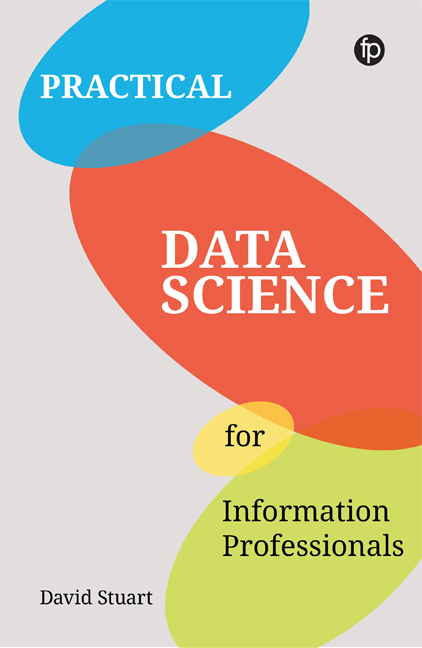Book contents
- Frontmatter
- Dedication
- Contents
- Figures
- Tables
- Boxes
- Preface
- 1 What is Data Science?
- 2 Little Data, Big Data
- 3 The Process of Data Science
- 4 Tools for Data Analysis
- 5 Clustering and Social Network Analysis
- 6 Predictions and Forecasts
- 7 Text Analysis and Mining
- 8 The Future of Data Science and Information Professionals
- References
- Appendix – Programming Concepts for Data Science
- Index
- Frontmatter
- Dedication
- Contents
- Figures
- Tables
- Boxes
- Preface
- 1 What is Data Science?
- 2 Little Data, Big Data
- 3 The Process of Data Science
- 4 Tools for Data Analysis
- 5 Clustering and Social Network Analysis
- 6 Predictions and Forecasts
- 7 Text Analysis and Mining
- 8 The Future of Data Science and Information Professionals
- References
- Appendix – Programming Concepts for Data Science
- Index
Summary
In essence this book is a natural follow-up to my first book, Facilitating Access to the Web of Data (Facet Publishing, 2011). Many of the ideas the book discussed are now widely accepted: library and information professionals have an increasingly important role in data management and access, data and data science are now the subject of massive and widespread interest, and the software and tools available have developed massively.
Since the first book was written libraries have become ever more involved in data management and access, and whereas the idea that there are advantages in library and information professionals having basic programming skills may once have been controversial, it is now an increasingly mainstream idea, which is widely acknowledged if not universally accepted. Programming skills are complementary skills rather than new skills, pushing the upper limits of how information professionals can help on the spectrum of data analysis. The changing attitude is reflected by including a few code examples throughout the book. It is not necessary for the reader to read or follow all these examples, but information professionals should be aware that there is much more that they can do if they are willing to step away from the comfort of the graphical user interface and engage directly with the data, and the easiest way to do this is by acquiring some basic programming skills. As will be seen throughout this book, in the intervening years it has also become much easier to write and share code.
The importance and potential of data is also more widely recognised than when Facilitating Access to the Web of Data was first published. Data scientist was not labelled the ‘sexiest job of the 21st century’ (Davenport and Patil, 2012) until the following year, when ‘big data’ also burst into public consciousness. Whereas data science was only mentioned once in Facilitating Access to the Web of Data, and big data not at all, unsurprisingly the terms are explored far more thoroughly in this book as librarians are increasingly expected to do more than merely facilitate access to the data that is available, but help analyse, visualise and interpret it.
- Type
- Chapter
- Information
- Practical Data Science for Information Professionals , pp. xv - xviPublisher: FacetPrint publication year: 2020



